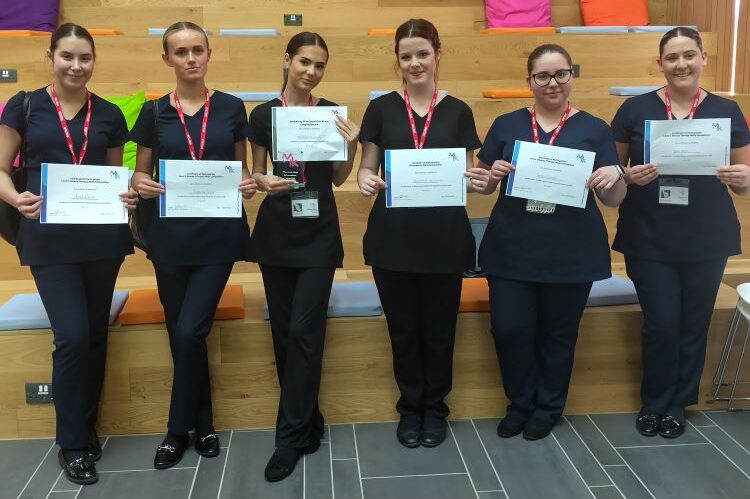1 in 5 A-Level students missed more that 20 days school due to Covid-19 this year

Research from the Sutton Trust (@suttontrust) highlights Pandemic disruption continuing in first year of exams since 2019
OVER 1 IN 5 A-LEVEL STUDENTS MISSED MORE THAN 20 DAYS OF SCHOOL DUE TO COVID-19 IN RUN UP TO EXAMS THIS YEAR
- As pupils sit the first national exams since 2019, 72% of teachers think the attainment gap between poorer pupils and their classmates will widen at their school.
- Almost half of teachers thought the extra measures put in place for this year’s exams didn’t go far enough.
- Concerns about grades among university applicants have increased since 2021.
Pandemic-related disruption continued to impact students in the run up to the first national exams since 2019, according to new research published by the Sutton Trust today. Over the past academic year, a third of A-level students who applied to university missed 11 or more days of school for Covid-related reasons, with over 1 in 5 missing more than 20 days.
A Levels and University Access 2022 surveys university applicants and teachers to give a picture of this year’s exams and university admissions cycle.
While some mitigations were put in place for exams this year to reflect ongoing disruption – including giving advance information on topics to be covered in exams – today’s polling of 4,089 teachers finds that almost half thought the measures hadn’t gone far enough. And only 52% of university applicants felt that arrangements for exams fairly took the impact of the pandemic into account.
Today’s research also looks at the types of catch-up activities that young people had been offered and took part in. The majority (74%) of the 434 applicants surveyed by Savanta said they were offered at least one type of catch-up activity listed over the last academic year. 36% reported being offered some form of tutoring – a key plank of the government’s education recovery strategy – and 19% reported they had taken part, while over half of university applicants (53%) reported being offered extra in-person classes before or after school, or at lunchtime.
Teachers continue to feel concerned about the impact of the pandemic on education. 72% think the attainment gap at their school will widen with the return of exams. 29% of teachers in deprived schools thought that the increase would be substantial, almost twice as many as those in more affluent schools (16%). Concerns are being felt among students too, with 62% of applicants feeling they have fallen behind with their studies compared to where they would have been without the pandemic.
Applicants were also more worried about their grades this year than last year, with 64% of university applicants saying they were worried about their grades, compared to 58% saying the same in 2021. Applicants from working class backgrounds were more likely to be concerned than those from middle class backgrounds.
These concerns come amid warnings that more students than usual will be left without a place at their preferred university this year, as selective universities make fewer offers and the school-leaver population grows. The Trust is calling for universities to give additional consideration to applicants from disadvantaged backgrounds who have narrowly missed their offer grades, to reflect the ongoing disruption to learning they will have faced.
To further address the challenges facing young people, the Trust is also recommending that:
- Schools and universities should provide as much support to students as possible around results day and during the clearing period this year.
- There should be further investment in catch-up activities, with targeted funding for those from the most disadvantaged backgrounds, recognising that the pandemic will impact the system for years to come.
- Pupil premium funding, targeted at disadvantaged pupils, should be extended to students in post-16 education.
James Turner, Chief Executive of the Sutton Trust, said:
“Today’s research highlights that the impacts of the pandemic on education are far from over – and the consequences are still being felt among young people and their teachers.
“As we approach results day and a more competitive university admissions cycle than ever, we must make sure that poorer youngsters have a fair chance to succeed. Universities should give additional consideration to disadvantaged students who have just missed out on their grades and make sure recent gains in widening access to higher education are not lost.
“As we recover from the pandemic, there still needs to be a laser-like focus on supporting pupils to catch-up, through significant ongoing investment in education recovery.”
Paul Whiteman, general secretary of school leaders’ union NAHT, said:
“This year’s exam cohorts have experienced large amounts of disruption due to Covid throughout their courses. Schools have done their absolute best to prepare them well for their exams and assessments, but the ongoing issues with teacher and pupil absence due to illness have been an additional challenge to overcome.
“School leaders do feel the government could have done more to help this year’s exam students but what is important once results are awarded is that universities and all onward routes for training, employment and further education take into account the realities of students’ experiences and work with them to get them on the right path for their futures.”
Dr Mary Bousted, Joint General Secretary of the National Education Union, said:
“The stresses of the pandemic are not over for young people, andthe government continues to fail them.
‘The Sutton Trust Research Brief confirms the experience of teachers: it is students from disadvantaged backgrounds whose preparation for A Levels has been most disrupted. It is these students who will suffer most from the new rationing of university places.
‘A government seriously committed to levelling up would have made stronger attempts to mitigate the effects of Covid on exam preparation. It would have ensured the funding that would have prevented universities from cutting back on places.
‘As it is, the government’s inadequate programme for educational recovery is compounding the damage done by the pandemic. The full effects of this double failure will be felt in the years ahead”.
Tom Middlehurst, curriculum and assessment specialist at the Association of School and College Leaders, said:
“This report reinforces the fact that this year’s A-level students, as well as other post-16 students taking vocational qualifications, have suffered more disruption than any cohort since the second world war because of the Covid pandemic.
“The situation has been extremely challenging for all concerned – with illness and isolation affecting students and staff alike over the past two years. All credit to everyone who has worked so hard to complete courses and take exams under these circumstances.
“Opinion is divided over whether the adaptations to this year’s exams to mitigate for this disruption went far enough but, in truth, no system was ever going to be perfect in such difficult conditions.
“The great danger is that the disruption will have badly affected disadvantaged students in particular and that the gap between them and other students will widen in this year’s set of results.
“For this reason it is more important than ever to focus on supporting student progression to university and apprenticeships to ensure young people can realise their goals and ambitions.
“We fully agree with the Sutton Trust’s recommendations for universities and employers to give disadvantaged students who narrowly miss offer grades additional consideration, and for universities to provide additional learning and wellbeing support.
“We also agree with the call for more government catch-up support for school and college students. It is extremely regrettable that the government is actually going in the opposite direction by reducing the subsidy it provides for tutoring programmes.
“And it is important that the Department for Education and Ofqual carefully consider what exam adaptations may be needed next year and do not rush to return to business as normal given that these students have also been disrupted by the pandemic and that fresh infection spikes are likely to cause more disruption.”
Stephen Morgan MP, Labour’s Shadow Schools Minister, said:
“The Conservatives’ miserable failure to help children recover from the pandemic threatens to cast a long shadow over children’s opportunities and widen the already gaping attainment gap.
“Labour is ambitious and optimistic for young people. Where the Conservatives have wasted millions of pounds on failed projects, Labour would be delivering small group tutoring for all who need it, breakfast clubs and afterschool activities for every child and mental health support in all schools to create a level playing field for all students.
“Every student should be supported this summer to move onto the next phase of their lives, but the Conservatives are so distracted bickering among themselves they’re neglecting our children’s futures.”











Responses